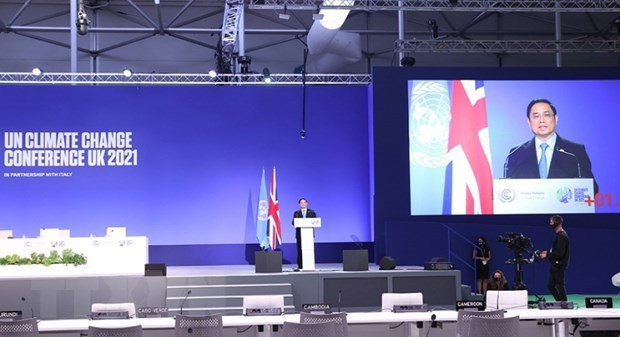
Prime Minister Pham Minh Chinh delivers his speech at COP26. (Photo: VNA)
Many of the UK’s newspapers, including the Financial Times, the Guardian and the Independent, have reported Vietnam’s commitments to net zero by 2050 and to phase out coal power between 2030 and 2040.
Vice Chairman of the Vietnam-UK Network Paul Smith said Vietnamese Prime Minister Pham Minh Chinh’s speech at COP26 was positive and well received. He said it does not matter Vietnam is a low emitter. What matters is Vietnam’s leadership in South East Asia and the world in the global fight against climate change.
Smith pointed out that PM Chinh, in his speech, has laid out an achievable plan for Vietnam to reach net zero by 2050. It was a real commitment from a country predicted to be one of the top 20 economies by 2050, he said, adding if Vietnam does not start the plan now, by 2050, it could be a leading economy and thus become a significant carbon emitter.
He said Vietnam now is in the great position to transform to green growth because it is a relatively new industrialised country and does not have the legacy as the same way as developed countries, particularly those in the west.
Smith also spoke highly of Vietnam’s key values delivered by PM Chinh, which are “discuss, work and win” and a bubble of unity, saying PM Chinh’s speech is a call for unity, which is needed in the global fight against climate change.
William Young, an environmental security expert at the Council on Geostrategy, said Vietnam’s commitments at COP26 have opened people’s eyes around the world about the leadership Vietnam is achieving in its fight against climate change, as well as the opportunities in Vietnam for economic growth on this subject.
Young said the Vietnamese PM is right when saying finance and technology are decisive. The commitment of leadership by a nation is not only made domestically, but also needs international support for that country to make progress.
He cited the case of South Africa, which was included earlier this week in a funding programme to eliminate coal, followed by Indonesia. He added that he would not be surprised if Vietnam will become part of that programme.
The environmental security expert pointed out that PM Chinh’s speech showed the recognition of the change in mood at the international level where a great deal of bilateral and plurilateral collaboration has been made. Different countries now work together not only at global level but at domestic level.
Whether the UK and Vietnam, or Germany and South Africa, countries that wish to work together should work together. The key thing, as PM Chinh said, is they must “discuss, work and win” to reach the common goal, he said.
Young said the green transformation will create opportunities for collaboration in trade, business, export and others, and countries, industries and businesses that capitalise those opportunities will become the most successful.
He pointed out that to tackle climate change, Vietnam should get wealthy and it will and can do this by building industries and export capability. Vietnam, as one of the countries in the world hardest hit by climate change, needs to make economic grow green and make it fast. And this will be one of the greatest protection against the risk for rising sea level and increased extreme weather.
Smith agreed that the move to sustainability in energy and lower carbon emissions will generate tremendous opportunities in many areas, including research and development, innovation, and manufacturing in a clean way that will itself create an economic boom. Given Vietnam has a young, bright and clever work force, the country is an ideal place to develop technology.
He also pointed out that Vietnam is always open to collaboration and recognises that it needs international collaboration to grow. This explains Vietnam’s tremendous success in the last 20 years and it will continue this success.
Speaking about the Vietnam-UK strategic partnership relationship, Smith stressed that this is not only an economic relationship, but also the friendship and trust relationship. The Vietnam-UK strategic relationship for security is also very important because that security stability will enable Vietnam to move forward as the player in the economic world in the future./.
VNA
 Earthquakes rattle parts of Southeast Asia
Earthquakes rattle parts of Southeast Asia



